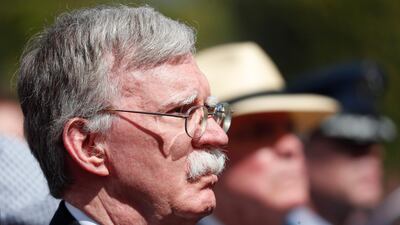Top US security officials will meet their Russian counterparts in Israel later this month in rare high-level discussions on Syria to hammer seemingly unattainable demands on Moscow to curb Iran, with Washington having all but vanished from the political radar as Tehran’s Shiite militia proxies control the ground.
Washington announced that National Security Adviser John Bolton will meet Russian Security Council Secretary Nikolai Patrushev in June without specifying the date. Moscow lets Israel strike Iranian targets in Syria regularly and the would-be presence of Israeli National Security Adviser Meir Ben-Shabbat at the meeting constitutes a Russian recognition of Israel’s concerns about the Iranian military reach.
However, Syrian opposition sources said Iranian weapon caches in Syria, many of which appear to have been moved underground, are purposefully cheap and easy to replenish.
Moscow has agreed to the meeting in Jerusalem, although Russian Foreign Minister Sergei Lavrov said last month that US demands regarding Iraq in Syria and the rest of the Middle East were “unrealistic”.

Washington had ignored the Iranian spread of influence in Syria as it pursued a nuclear deal with Tehran and focused on defeating ISIS under the Barack Obama administration. Despite President Donald Trump’s criticism of his predecessor, little has changed as far as practical policy in Syria under him.
Deputy US Chief of Mission at the US Embassy in Moscow Anthony Godfrey told Tass news agency earlier this week that Russia is aware that some Iranian policies are not in the interest of Russia and that Washington hopes the meeting in Israel would produce “a more productive way” to deal with Iran.
Veteran Syrian political analyst Ayman Abdel Nour said Moscow might agree with Washington on a need to remove Iranian forces from Syrian border areas with Iraq, partly because their strength there ultimately poses harm to Israel. The Shiite militias are seen as having assumed control of the Syrian border town of Al Bukamal and other border areas, securing an Iranian-controlled line stretching from Iran, through Syria to Hezbollah strongholds in Lebanon’s Bekaa Valley.
Despite Russia’s military strikes and its crucial backing to scorched earth campaigns by the Syrian regime against masses of its Sunni population, Moscow has faced limits to its abilities in Syria. A US-backed Kurdish militia has been in control of large swathes of eastern Syria since they helped Washington defeat ISIS earlier this year, forming the bulk of the ground component of the operations.
An announcement by President Trump in February to withdraw US forces from Syria has not been realised and a five-week Russian air campaign on the opposition-held Idlib governorate appears to have stalled as opposition forces fought back loyalist forces with apparent Turkish help. Mr Abdel Nour said renewed Turkish support for rebels was likely met with Washington’s approval.
“Remember, the Americans too can act as spoilers,” Mr Abdel Nour said by phone.
Moscow intervened militarily in the Syrian conflict in late 2015 to prop up the regime of Bashar Al Assad. Mostly Islamist rebel forces backed by Turkey, Saudi Arabia and Qatar advanced through northern Syria and came close to isolating the heartland of Mr Al Assad’s Alawite minority sect in the coastal mountains from his seat of power in Damascus.
Following the Russian intervention, Washington reduced its backing for southern rebels in areas close to Israel who were too close for comfort to the regime. Eventually Washington abandoned those rebels by not opposing a deal between Russia and Israel to let the Assad regime back into the south.
However, rebel surrender there has been followed by a plethora of Iranian-backed militias, supervised by Hezbollah, which have spread in the south and led a militia recruitment and Shiite conversion effort, according to residents and opposition sources.
Across Syria, but especially in the south, Iran has been working closely with Airforce Intelligence and Military Intelligence, the two most powerful of the myriad Syrian secret police branches that have been the most lethal in the crackdown on the initially peaceful protest movement. Iran has built up loyalist militia along areas on the Lebanese border and in Aleppo as well as in the Deir al-Zor province on the border of Iraq.
Russia might be uncomfortable with Iran having such strong spread on the ground in Syria, Syrian political writer Mazen Ezzi said. But Moscow lacks the tools to reign in Tehran, he said, pointing to other interests between Moscow and Tehran, ranging from bilateral ties to the nuclear file to the oil and gas sector.
“Moscow cannot afford to be at odds too much with Iran in Syria. For Russia, Syria is a negotiation platform to and open venues with other world powers. Syria for Iran is a physical cornerstone in which they have invested massively,” Mr Ezzi said by phone.
“The Russians realise their firepower is not enough in Syria,” Mr Ezzi said. “On the ground they need the Iranian militia that are full of ideological fervour against the Sunnis.”


